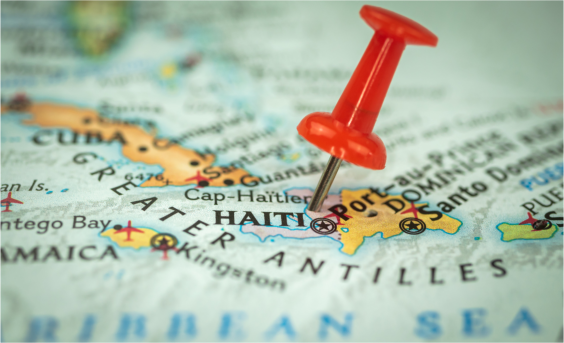P-to-P, June 12, 2024 [AlterPresse]— The Presidential Transitional Council (Cpt) proceeded, this Wednesday, June 12, 2024, to the installation of the new Prime Minister Garry Conille as well as the 14 ministers of his government, observed the online agency AlterPresse.
The installation ceremony took place at the Villa d’Accueil (headquarters of the political administration), in the presence of members of the Cpt, the outgoing Prime Minister, Michel Patrick Boivert, judicial authorities, officials from high commands of the Haitian National Police (Pnh) and the Armed Forces of Haiti (Fad’h), political protagonists, representatives of civil society and members of the diplomatic corps accredited in Haiti.
A delicate and historic mission to be accomplished by the transitional authorities
The mission of this transitional government, installed in accordance with the agreement of April 3, 2024, consists of working jointly with the Presidential Council, with a view to fully curbing the multidimensional crisis, that is to say the political, security, humanitarian, which has worsened since the assassination of the President of the Republic on July 7, 2021″, declares the coordinator of the Cpt’s actions, Edgard Leblanc Fils, in a speech for the occasion.
“The Cpt and the government have a delicate and historic mission to accomplish. We must succeed to revive hope for the future of the country. We must rise to the occasion of this difficult task, to meet the expectations of a population which has suffered so much in its flesh, its property, its spirit and its dignity.”
It is up to its transitional government to restore security and revive the economic and social activities of this country, ravaged by armed gang violence, the Cpt reminds the Prime Minister.
We must also “awaken consciences and mobilize all energies, in order to pave the way for the organization of free, democratic, credible, transparent elections, the results of which will be accepted by all”.
Edgard Leblanc Fils insisted on the reform and strengthening of national security forces, the preparation of the National Conference, the strengthening of state institutions to fight corruption and impunity.
The transition roadmap, provided for in article 45 of the “agreement of April 3, 2024 for a peaceful and orderly transition”, is called upon to guide the actions of the government during the transition period, underlines Cpt. .
The reform and strengthening of national security institutions are essential to the survival of the Haitian nation.
“You will need to define a national security strategy, which will include the objectives to be achieved, the means to be implemented and the resources to be mobilized by the State to ensure the security of the territory, protect the Haitian population and its vital interests” .
Garry Conille’s commitments
“Haiti faces major challenges. Violence and insecurity paralyze our daily lives. Humanitarian crises exacerbate the suffering of our most vulnerable compatriots. And political instability undermines the very foundations of our society,” describes the head of the new transitional government, in remarks made for the occasion.
He calls on everyone to show courage and determination to overcome these painful realities.
“Together, we can transform these challenges into opportunities, to rebuild our country on stronger and fairer foundations,” Garry Conille remains convinced.
“My government will work tirelessly to improve the living conditions of every Haitian, to build a more secure and prosperous future to restore the dignity of our people.”
The Prime Minister asks his ministers to participate valiantly in a common effort to promote and fuel a culture of change in the spheres of activity falling within their respective jurisdictions.
A collective contract was signed with the Haitian people through the Cpt to materialize the agreement of April 3, 2024, which provides for a set of major projects, such as public and national security, economic recovery, infrastructure rehabilitation, food and health security, the national conference and the constitutional question, the rule of law and justice, as well as the elections for the renewal of political staff, points out Conille.
“This paradigm of change”, which “irrigates all aspects of government action, will inspire and illustrate our posture and all the actions that we will be called upon to take at the head of government”.
Conille considers it crucial that “our police officers and soldiers are well prepared to face current security challenges,” promising to ensure that they have the necessary tools to accomplish their mission efficiently and professionally.
As requested by Garry Conille, a minute of silence was observed in honor of the three national police officers from the Temporary Anti-Gang Unit (Utag), Emelin Fermetus, Peterson Clovis and Wilkens Jean Junior Piton, cowardly murdered, on Sunday June 9, 2024, by the coalition of armed gangs, called Live together,and of all victims of terror and other violence by armed gangs.
The Cpt’s decree, appointing the 14 members of Garry Conille’s ministerial cabinet, was officially published on Tuesday June 11, 2024in the official newspaper of the republic “Le Moniteur”
In charge until February 7, 2026, date of the transfer of power to the elected officials for the 2025 elections, the transitional government includes 14 ministers, including 4 women, for 18 ministries.
Recovering Haiti from a criminal disaster
By far the most thorny issue that the new transitional government must address is that of security. Nothing has significantly changed since the start last February of the relentless offensive by the coalition gangs on the capital.
Neighborhoods controlled by gangs remain deserted and the last residents forced to live in these areas are subject to constant threats and harassment, local residents report.
People continue to be killed, women raped, houses vandalized, movements carefully monitored in neighborhoods or peripheral areas of Carrefour, Plaine du Cul-de-Sac, Croix-des-Bouquets, Tabarre, Pernier, Gros- John, etc.
Same situation in several neighborhoods in the city center or surrounding areas: lower Delmas, Solino, Bel-Air, Carrefour-Feuilles and many other areas.
The recent assassination of the three police officers brings to 21 the number of officers killed by armed bandits since the start of 2024.
There are now 578,000 people forced to move across the country due to escalating gang violence, according to the International Organization for Migration (IOM). Until March, this figure was estimated at just 362,000.
An influx of displaced people from the metropolitan area of the capital, Port-au-Prince, to the great south of Haiti has been observed.
While the percentage of displaced people in the metropolitan area is 15%, that of people heading towards the departments in the south of the country is estimated at 130%.
A recovery is noted at the international airport of Port-au-Prince, which should bring some breathing space to the economy. But all the roads linking Port-au-Prince to the regional departments are controlled by gangs, who are multiplying toll booths.
This situation has a disastrous effect on agricultural production, which rots in regions where prices fall, while products are not available in the capital where their prices rise.
Whether from a security, economic or humanitarian point of view, the problems only continue to accumulate, while the population struggles alone with its problems. [emb rc gp apr 12/06/2024 14:35]










